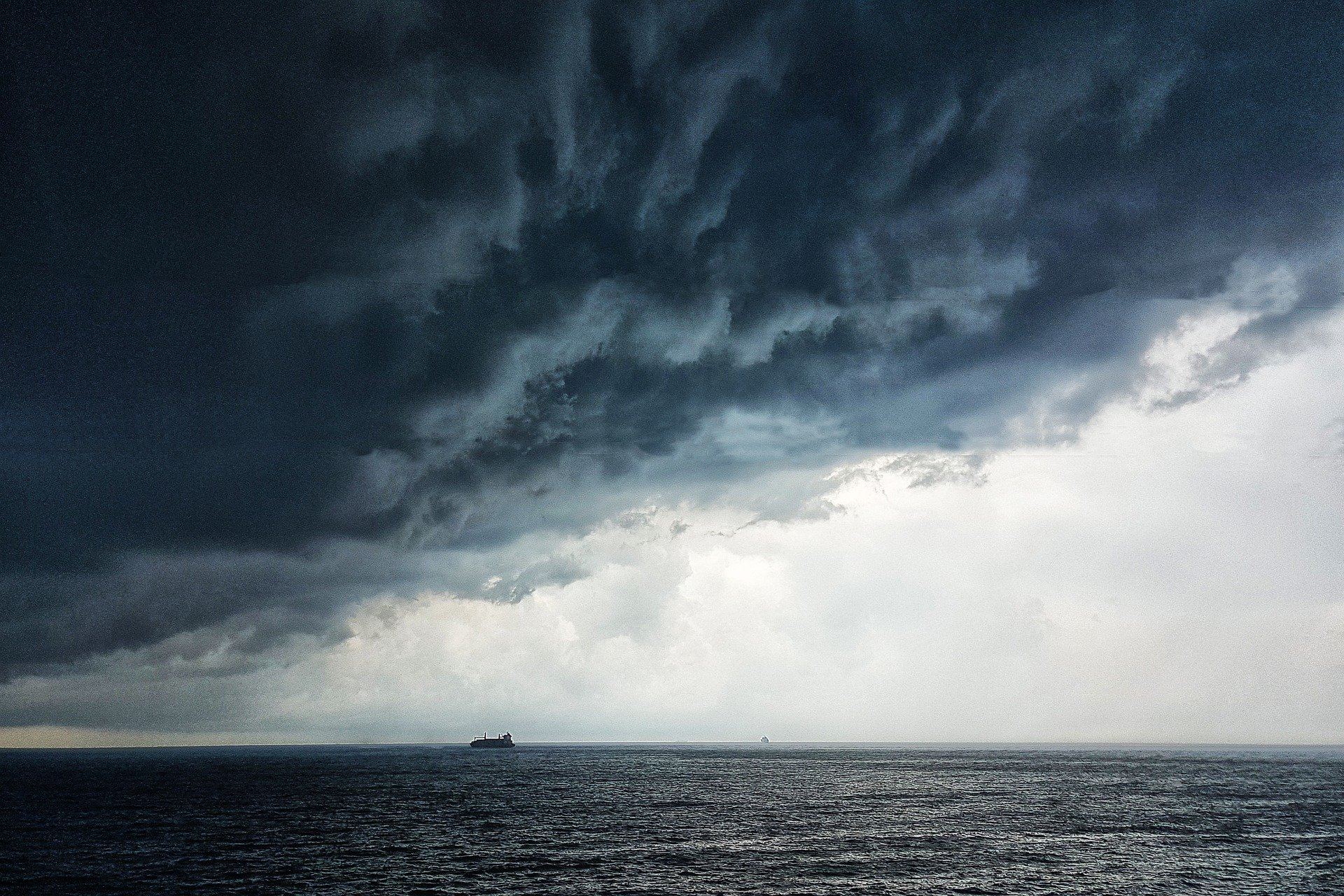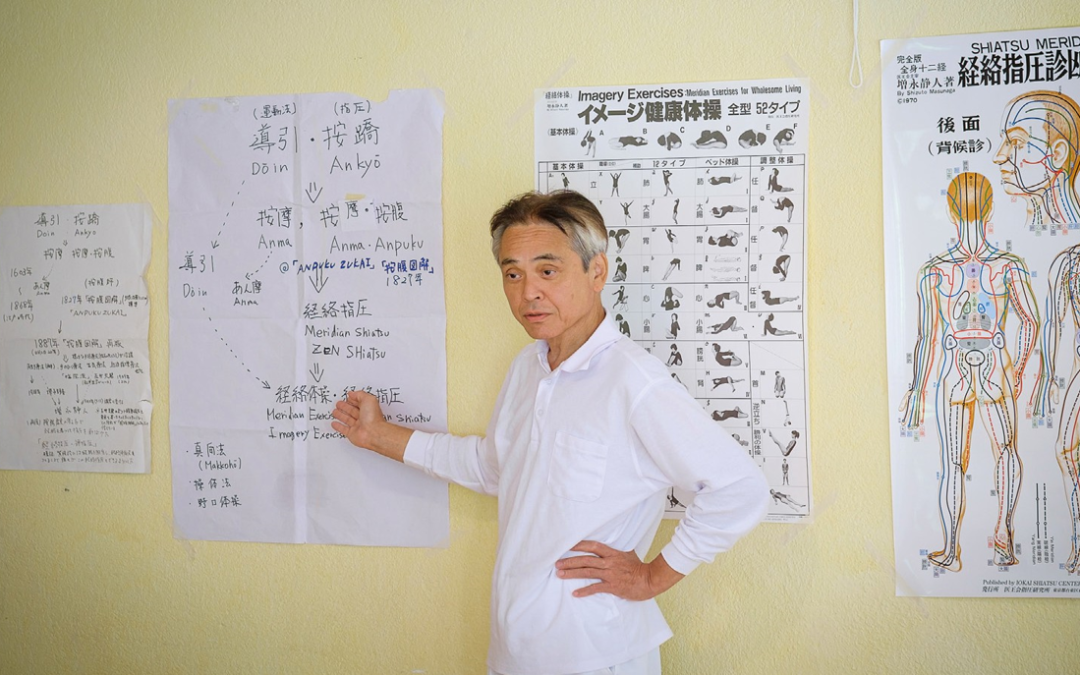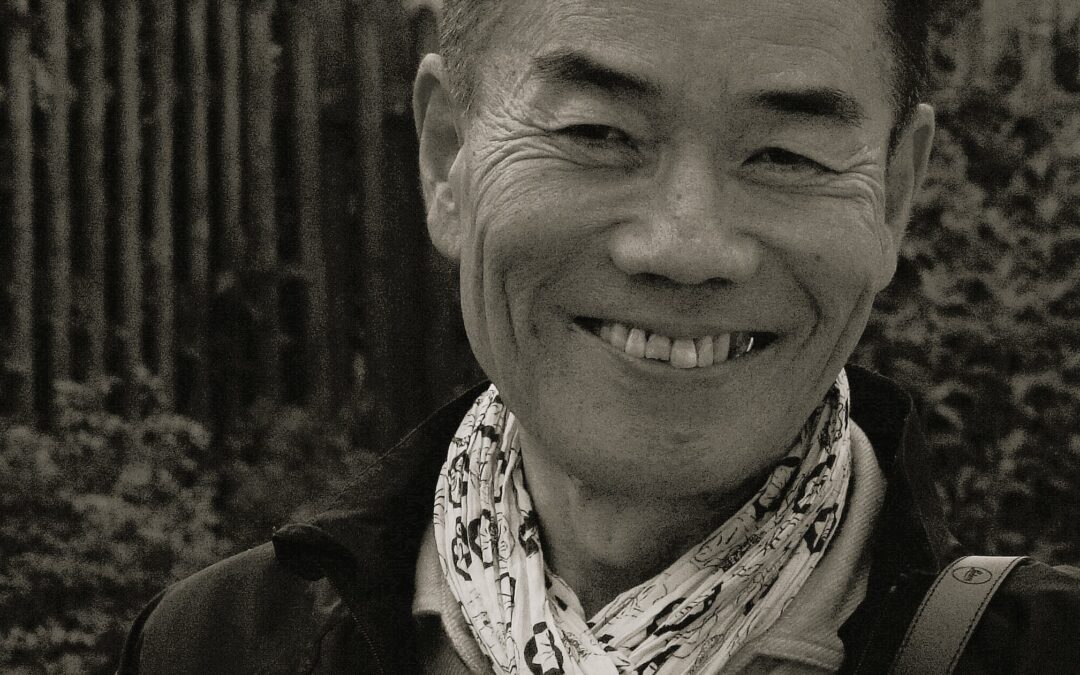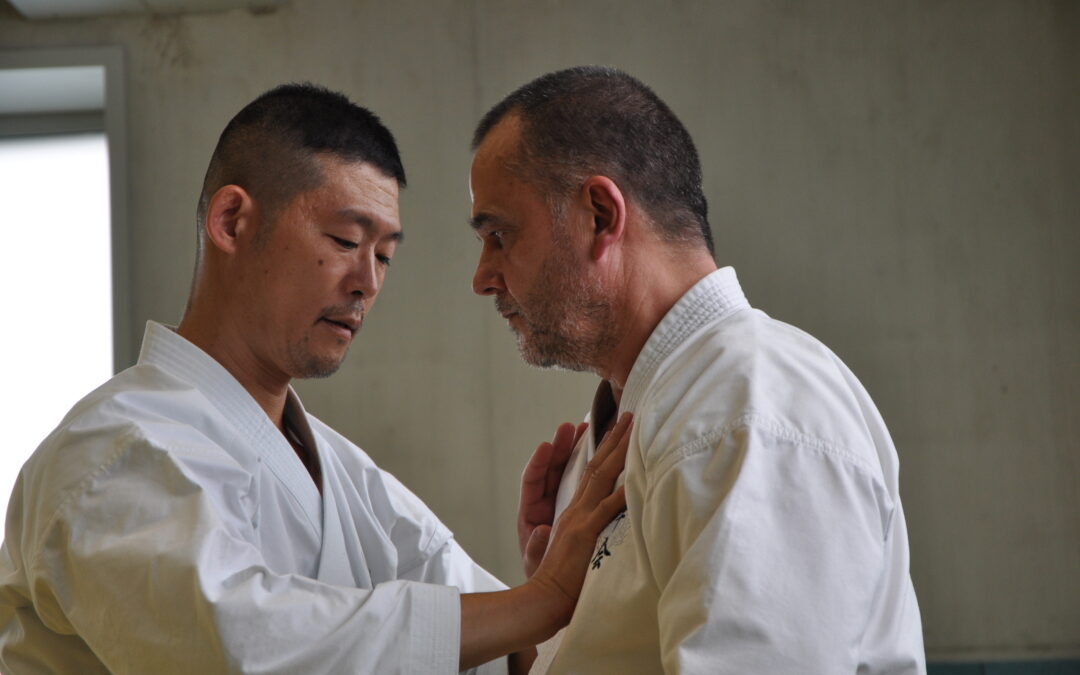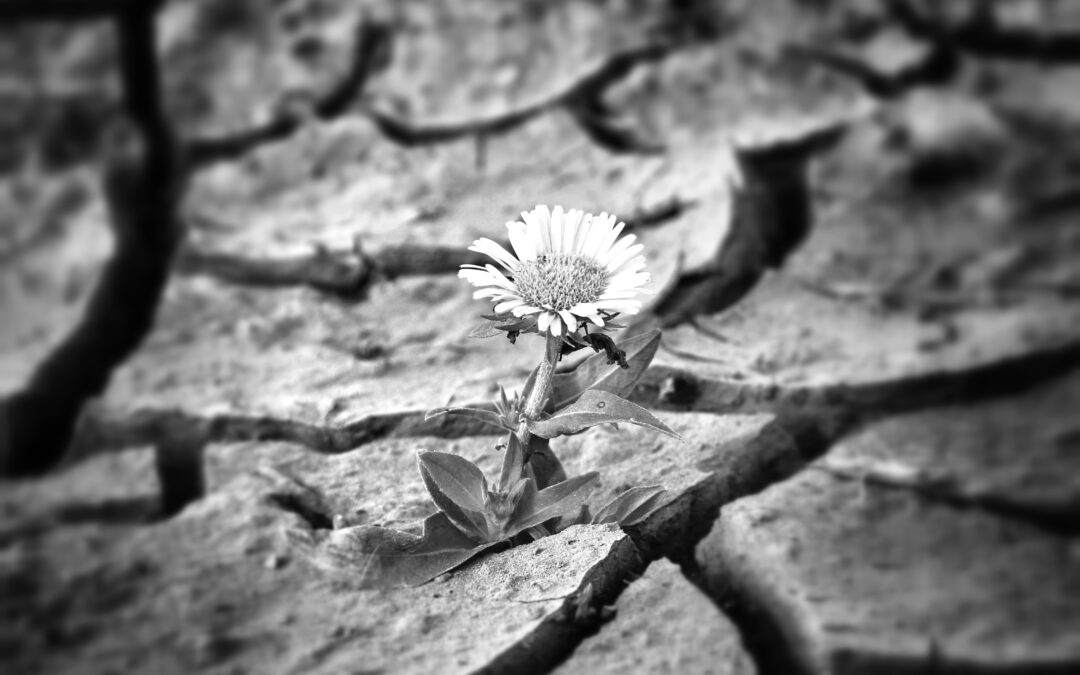Amongst the different climatic factors that can attack the body, there is the Wind. Cold or hot, humid or dry, the wind combines with other factors to aggress the body. Who has not experienced a cold, unpleasant spring or autumn wind that immediately tenses the back of the neck? This is a classic that we need to learn to treat. Fortunately, for us, there are many points that fight the wind.
Wind is the climatic energy of spring; it is associated with the Wood Element. Why repeat this obvious fact? Because it means that the organs associated with Wood energy are particularly affected by this type of aggression. Normally the body is well covered during this season and therefore the exposed points on the head and the neck are those that will suffer the most from the Wind. On the head there is the Gallbladder meridian. Let’s keep this in the back of our minds.
The Wind easily creates neck tensions which affects both the Bladder and Governing Vessel meridians. This tightness is also the cause of occipital headaches. Let’s again, add these two meridians to our list.
Observing nature, we see that the wind agitates the surface of water. What can we say about the sea that churns and swells under the influence of the wind, making powerful waves? We see the Wind agitates by moving rapidly. These are two typical symptoms of a Wind attack. Within the meridian system, the Waterways, (Triple Warmer) will also be one of the affected meridians.
Once again, we have another meridian to include in our list.
We breathe all the time, so the first organ affected by the Wind is the Lung. The Wind always starts by attacking the Lung and the skin. The Lung is partnered by the Large Intestine, which can also be affected. So, let’s now include these two meridians in our list.
Finally, there are specific meridians which are very sensitive to all climatic changes or disturbances of any kind, these are, the Stomach and the Small Intestine. The exposure of the stomach/abdominal region to a cold wind (short t-shirt, low- cut jeans), can rapidly cause diarrhea, this is because there is very little protection between our intestines and the outside world, this is one of their particularities.
Our short list allows us to understand which meridians suffer from the Wind and will consequently develop defense strategies for this particular climatic aggression. It is on these meridians that we will find the most important points to combat the pernicious effects of the Wind.
Wind is yang in nature, moving permanently, changing direction and creating agitation. The External Wind penetrates the body through its surface and settles in the space between the skin and the muscles. It disturbs the circulation of the Wei Qi and opposes the movements of the Lung Qi, disturbing its functions of descent and diffusion of the Organic Liquids. The Wind affects the Gallbladder and Liver meridians at the level of the head and neck and creates deviations of the face. An Internal Wind is born from an imbalance of the Liver or from the extreme heat during a fever.
The effects of the wind
Why should we treat the Wind? Because it is a very painful condition to experience. Pain quickly changes its location throughout the body. At one moment in the neck, then a few hours later in the shoulder to finally finish elsewhere. The wind moves, causing erratic pain.
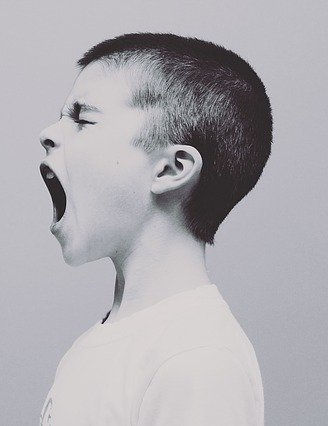
Another painful aspect of the Wind is that it agitates the body: we observe shivering and shaking, hands that can no longer hold still. The Wind agitates the mind. In many countries or regions where the wind blows for days, people can be very tense and nervous, uptight and on edge, the crime rate has been seen to increase significantly!
You have to have experienced the “autan” or “mistral” winds in France to understand this phenomenon.
Wind stirs water, as we have noted but it also dries it up. Leave your washing outside on the line on a windy day and it will quickly dry. This can be the same within the body.
Wind stirs the Organic Liquids. This is not good because the body’s internal homeostasis depends on a moist environment
How does the Wind attack the meridians and the organs?
By repeatedly attacking the skin which is linked to the Lung. It is an attack on our Wei Qi, the defensive Ki of the body. If this is not strong enough, then the doors, (our pores) are open to a deeper attack on both the energetic and physical body. This is how we change progressively from an external Wind to an internal Wind. The internal Wind will choose the Gallbladder as a favourite target and from there can end up in the Liver. This can cause serious problems.
External and internal symptoms are distinguished as follows:
- External type: Aversion to the cold or the wind, sneezing, coughing, runny nose. Fever, occipital stiffness. Irritation of the throat. Presence or absence of perspiration. Headaches with wind. Floating pulse on the surface.
- Internal type : Aversion to the cold and or the wind but the causes are due to the aggression of the Liver. Extreme heat which generates Wind. Rising of Liver Yang which becomes Liver Wind. Emptying of the Blood of the Liver or of the Yin of the Liver which generates the Wind (Emptiness). Tics, nervous tremors. Intense dizzy sensations. Dizziness and numbness. Tongue with a tendency to move to the side when pulled. In severe cases: convulsions, unconsciousness, hemiplegia, deviation of the mouth. This is more common in the elderly.
In conclusion, the Wind creates agitation, disturbs the energy, the Blood, the psyche, the Yin. It is therefore essential to know the points that help to drive it out of the body.
Summary of Points
- Lung: LU7, LU10, LU11
- Large Intestine: LI1, LI3,LI4, LI5, LI11, LI15
- Stomach: ST8, ST36, ST44
- Heart : HT9
- Small intestine: SI2,SI3, SI5, SI12, SI17
- Urinary Bladder: UB2, UB7, UB10, UB11, UB12, UB13, UB17, UB40, UB58, UB66
- Pericard : PC9
- Triple Heater: TH1, TH3, TH5, TH6, TH10, TH17
- Gallbladder: GB2, GB20, GB30, GB31, GB34, GB39
- Governor Vessel: GV2, GV3, GV8, GV11, GV12, GV13, GV14, GV15, GV16, GV20, GV22, GV26
Description of the Points
LIEQUE (Interrupted Sequence) L7
Info: Conception Vessel Opening Point, Luo Point, Head Command Point.
Effects: Drive out External Wind from the head, regulate Lung Qi, calms, cough and asthma
Classic combinations:
Heat of the Lung and Stomach with cough and headache: LU7, LI4, ST8, ST36.
- Cold wind on the neck: LU7, LI4, UB10, UB11.
- Cold Wind invasion with a background of chronic sinusitis: LU7, LI4, LI20, ST2, ST3, ST40 in dispersion.
- Cold wind with nasal discharge: LU7, LI4, LI20, UB2.
- Cold like wind with acute cough, white sputum and predominance of chills: LU7, LI4, UB13, CV22 in dispersion.
- Wind Invasion : LU7 for colds, allergic rhinitis, sinusitis.
- Influenza: LU7, LI4, UB10, UB11, GV16 in dispersion.
- Cough due to External Cold Wind: LU7, LI4, UB11, UB13 in dispersion.
- Wind Dryness with acute dry cough, dry throat and nose, not necessarily signs of Heat: UB7, LI4 in dispersion, LU5, KD6 in toning.
YUJI (Fish Border) LU10
Infos : Ancient Shu Point Fire Creek.
Effect: Dispels the external attack of Cold Wind, disperses the Fire of the Throat and Lung
Classic combinations:
- Cold wind with cough and throat pain related to lung heat: LU10, UB13, LI4
- Wind Heat and Lung Heat: LU10, LU11.
SHAOSHANG (Lesser Metal) LU11
Info : Antique Shu Point Wooden Well, Demon Point.
Effect: Against Wind Heat and Lung Heat, Reanimation Point
Classic combination :
- Hot wind like mumps, tonsillitis, eczema, sunstroke: LU11, LI4, LI18, SI17 in dispersion.
SHANGYANG (Metal Yang) LI1
Info : Ancient Shu point Metal well, Root point
Effect: Eliminates YangMing Wind Heat
Classic combinations:
- In cases of flu with fever without sweating, sore throat: LI1, LI4, SI17, GV14 in dispersion.
- Also chases the External Wind during conjunctivitis, arthritis of the hand and shoulder: LI1, LI4, UB62 in dispersion, UB2, GB1 in harmonization.
SANJIAN (Third interval) LI3
Infos : Point Rivière Shu Bois.
Effect: Eliminates Wind Heat in cases of acute eye inflammation.
Classic combination :
- Chronic illness due to Cold Wind: SG3, UB62 in Harmonization or Moxa.
HEGU (Junction Valley) LI4
Info : Point Source, Point Commande visage, Point Abortif.
Effect: Releases the surface and drives out the external cold wind, removes pain, opens the orifices, awakens the brain, releases intestinal heat.
Classic combinations:
- Cold wind headache with dizziness: LI4, GV14, GB20, Tai Yang.
- Eliminates External Wind: LI4, LU7 in dispersion or LI4, KD7 to calm perspiration or LI4, LU7, TH5.
- To calm the hyperactivity of the Liver Yang and the Internal Wind: LI4, LV3 in case of hypertension with dizziness, headaches, and aggressive driving. Add GV20, KD1 in case of severe and acute hypertension.
- External wind with acute bronchitis: LI4, LU7, UB13, ST36 in dispersion.
- Wind-Heat like allergic rhinitis: LI4, LI20.
- Wind-Heat with dermatological disorders: LI4, LI11, GB20, GB31.
- Cold wind with acute rhinitis, clear mucus, sneezing, predominance of chills: LI4, LI20, LU7, UB11, UB13 in dispersion, UB2 in harmonization.
- Wind Heat with acute rhinitis, sore throat and eyes and itching, signs of Heat: LI4, LI20, LU7, TH5, LI11 in dispersion, UB2 in harmonization.
YANGXI (Yang Stream) LI5
Infos : Ancient Shu Point Fire River.
Effect: Eliminates a Wind Heat, facilitates the circulation
Classic combination :
- Wrist arthritis: LI5, LU7.
QUCHI (Pool at the Bend) LI11
Info: Ancient Shu Point Sea Earth, Demon Point.
Effects: regulates the Stomach and the Large Intestine, releases the surface, makes the Blood circulate, softens the joints and drives out the Wind.
Classic combinations:
- LI11 and ST36 take the wind out of your body.
- Add GV14 and GB20 against the blockage of meridians by cold wind with pain.
JIANYU (Shoulder and Clavicle) LI15
Info : crossing point with the YangQiaoMai, with the Heart, the Bladder and the Luo of the Small Intestine
Effect : Chases the Wind away from the 4 limbs, treats the Bi (rheumatism) of the shoulder, improves the paralysis
Classic combination :
- Obstruction and pain in the anterior aspect of the upper limb: LI15, LI11, LI4.
YINGXIANG (PReceiving Fragrance) LI20
Infos : Meeting point of the YangMing
Effect: Its main action is to clear the nose. Eliminates Wind and Heat.
Classic combinations:
- In case of Wind-Heat: LI20, TH5, LI11 in dispersion.
- In case of cold wind: LI20, UB10, UB13 in dispersion or Moxa.
- Cold wind with chapped lips and facial pain: LI20, LI4, E4, GB20 in dispersion
- Cold wind with neck and shoulder stiffness: LI20, LI4, LI18.
TOUWEI (Head’s Corner) ST8
Info : crossing point with the Stomach and the YangWeiMai
Effect: Drives away Wind and Cold, treats headache, calms dizziness, treats facial paralysis.
Classic combination :
- Rising hot wind with migraine or headache: ST8, GB20, LU7, LI4.
- Wind Heat Humidity with temporomandibular arthritis: ST8, ST6, ST7.
ZUSANLI (Leg Three Miles) ST36
Info: Ancient Shu Point Sea Earth, Command Point of the abdomen, Abortifacient Point, Lower Sea Point of the Stomach.
Effect: Dispels Wind of the 4 limbs and abdominal pain, harmonizes Blood and Qi, strengthens Spleen and Stomach, prevents infection…
Classic combinations:
- Blockage of Qi by cold with pain in the epigastrium: ST36, CV6, CV12.
- Wind Heat Moisture like knee arthritis: ST36, ST35.
NEITING (Inner Court) ST44
Infos : Ancient Shu Point Water Stream.
Effect: Treats Internal Wind with fever and fainting, cools YangMing Heat/Humidity (E/GI), calms pain.
Classic combinations:
- Eliminates Wind Heat with sore throat, pharyngitis: SI1 and SI17.
- Wind Heat with tonsillitis, sore throat, headache, nosebleed, conjunctivitis: SI1, UB2, UB67, TH3, GB1 in harmonization.
- External Wind and Qi Stagnation in facial pain: SI1, SI18.
- Wind Heat with temporomandibular arthritis: ST44, ST6, ST7, LI4 in dispersion.
SHAOCHONG (Lesser Surge) HT9
Info : Antique Shu Point Wood Well, Toning Point.
Effects: Eliminates Internal Wind with fever, delirium, seizure and fainting, soothes Shen, circulates Qi, eliminates heat.
QIANGU (Front Valley) SI2
Info: Ancient Shu Point Water Creek.
Effect: Eliminates Wind Heat in the GI, treats numbness of the little finger
Classic combinations:
- Arthritis of the hand with heat and swelling: SI2, SI3, SI5 in dispersion, UB66, KD6 in toning.
- Wind-Heat with ear infection: SI2, SI19.
- Wind Heat with headache and neck stiffness: SI2, UB66.
HOUXI (Back Stream) SI3
Info: Governor’s Ship opening point, Wood River ancient Shu point, Tonification point.
Effect: Treats Wind, Wind-Cold or Wind-Heat, stimulates TaiYang (LI/UB), eliminates Xie (perverse) outward, treats upper back, treats epilepsy, pairs with UB62.
Classic combinations:
- Invasion of Cold Wind with stiffness of neck, shoulders and back: SI3, SI12, UB10, UB62. Add UB2, UB10 if frontal headache.
- Against fever, cold, flu: SI3, GV14.
- Wind Heat with conjunctivitis, fever, arthritis of the hand, arm, nosebleed: SI3, SI17, GV14 in dispersion, KD6 in toning.
YANGGU (Yang Valley) SI5
Info : Ancient Shu point Fire River, Root point
Effects: disperses heat, suppresses wind, promotes circulation
Classic combination :
- In case of Wind-Heat like mumps: SI5, SI17.
BINGFENG (Grasping the wind) SI12
Info: Treats paresthesia problems of the shoulder, arm, neck
Effects: Calms pain, facilitates circulation in the meridian
Classic combinations:
Shoulder paresthesia: LI7, SI11, SI12
Paresthesia of the arm: LI12, SI8, SI12, UB41
Paresthesia of the neck: SI12
TIANRONG (Heavenly Appearance) SI17
Info: Window of Heaven point, crossing point with the Gallbladder.
Effects: Eliminates Wind Heat, removes Tan, treats whistling ear.
Classic combinations:
- Wind Heat as a sore throat or acute hoarseness with cold or flu, signs of Heat: SI2, SI17, LI4 in dispersion.
- Wind-Heat with sore throat and acute tonsillitis: SI17, SI1.
ZANZHU (Gathering bamboo) UB2
Effects: treats eye problems, purifies heat, clears the nose, relieves headaches
Classic combinations:
- In case of Cold Wind like nasal congestion: UB2, UB10, UB12.
- During a Heat and Fire Wind of the Liver such as conjunctivitis: UB2, UB18.
- In case of Cold Wind or Hot Wind like allergic rhinitis: UB2, UB67.
- In Cold Wind and Empty Kidney Qi such as conjunctivitis: UB2, UB10, UB67.
- Wind Heat with conjunctivitis: UB2, GB1 in Harmonization, GB43, TH3 in dispersion.
TONGTIAN (Reaching Upward) UB7
Effects: Eliminates perverse energies from the surface, treats nasal obstruction, drives out cold from the 4 limbs, improves paralysis.
Classic combinations:
- Loss of diffusion function of the lung with nasal obstruction: UB7, GV23, GB20, LI4.
- Excessive lacrimation, rhinitis, headache, facial paralysis, nosebleed, sinusitis: UB2 to harmonize, UB7, UB67, SI3 in dispersion.
TIANZHU ( Upper Pillar) UB10
Infos : Point Window of Heaven,
Effects: Dispels Cold Wind, relieves neck, treats loss of use of hands, eliminates occipital headaches.
Classic combinations:
- In case of Cold Wind with neck and head pain, nasal congestion and loss of smell, cough, asthma, sore and swollen throat: UB10, UB2, SI12.
- Cold wind as aches and pains in the neck and back: UB10, UB60.
- Invasion of External Wind with sneezing, coughing, asthma, sore throat, aches in the shoulders, neck and back, cold: UB2 in tonification, UB10 in dispersion or Moxa, GV23, LU7, LI4, LI20 in dispersion.
DAZHU (Great Vertebra) UB11
Info : Bone Meeting Point, crossing point with the Small Intestine, Sea Point of the 12 meridians
Effects: Frees the surface, strengthens Bones, and drives out Wind.
Classic combinations:
- Cold wind attack with rebel Qi rise, headache and dizziness: UB11, UB10, UB60, SI3.
- In case of cold wind like a flu with aches and pains: UB11, UB12, UB13.
- In case of Wind-Heat and Lung-Heat like pneumonia: UB11, UB13.
- When Cold Wind and Empty Lung and Kidney Qi such as a recurring cold and slow healing: UB10, UB11, UB13, UB23.
FENGMEN (Wind Gate) UB12
Info: Gate point, crossing point with the Governor’s ship.
Effect: Eliminates the invasion of External Wind for nose and throat problems, clears the surface
FEISHU (Lung Transporter) UB13
Infos : Shu point of the back of the Lung
Effects: Chases the Wind, treats emptiness or fullness of the Lung, reduces cough and asthma.
Classic combinations:
- Cold wind-related cough: UB13, LU7, LGI4.
- Sneezing, throat irritation, pain in the upper back: V12, V13, in dispersion or Moxa, LU7, LI14, CV22 in dispersion.
- In case of hot wind during a cold or flu with sore throat and dry cough: UB13, LU10, LI4, SI17 in dispersion.
- During a Dry Wind with dry cough, dry nose, throat and mouth: UB13, LU7, LI14 in dispersion, LU5, LU9, KD6 in tonification.
GESHU (Diaphragm Transporter) UB17
Info : Blood Meeting Point.
Effects: In case of Wind Heat and Blood Heat, opens the chest, regulates Blood and Qi
Classic combination :
- Urticaria and generalized itching : UB17, UB40, UB67.
WEIZHONG (Middle of the Crease) UB40
Info: Ancient Shu Point Sea Earth, Command Point of the back, Lower Sea Point Bladder.
Effects: Treats the Wind of the lumbar and thigh, dissolves the stases of Blood, relieves the tendons, disperses heat, calms vomiting and diarrhea.
Classic combination :
- Blockage of meridians and pain in the lumbar region, buttock and thigh: UB40, UB54, UB57, GB34.
FEIYANG (Taking Flight) UB58
Info : Bladder communication point.
Effects: Fights the invasion of the External Wind, calms the pains, facilitates the circulation
Classic suit :
- External wind with nasal obstruction, headache, arthritis of the legs: UB58, UB2, UB10, UB12, UB62, LI3, LI20 in dispersion.
TONGGU (Foot Valley Passage) UB66
Infos : Ancient Shu Point Water Stream.
Effect: Dispels Wind and Disperses Heat (External and Internal) with Stiff Neck Fever
Classic suit :
- Headache, dizziness, nosebleed: UB66, LI4, GV14, GV16 in dispersion.
ZHONGCHONG (Middle Rushing) PC9
Info : Antique Shu Point Wood Well, Toning Point.
Effects: Eliminates the Wind, disperses the heat of the Heart, makes the Blood circulate, opens the orifices, makes one regain consciousness.
GUANCHONG Surge Gate) TH1
Infos : Point Shu antique Metal well.
Effect: drives away the Internal Wind in cases of fever, sunstroke or even loss of consciousness, disperses heat, awakens the Shen.
Classic combinations:
- To eliminate Wind Heat: from TH1 to TH10.
- Wind Heat with dry and painful lips, mouth and throat: TH1, TH4, KD6, SP6, ST36 in alignment.
- Wind Heat with arthritis of the fingers and hand: TH1, TH2, TH3, TH4, GB43 in dispersion, KD6 in tonification.
- Heat wind, Liver fire with conjunctivitis: TH1, GB44.
- Wind-Heat with urticaria: TH10, GB31.
- Wind Heat with eye and ear problems: TH1, TH3.
- Wind-Heat with throat problems: TH1, TH10.
ZHONGZHU (Central Islet) TH3
Info : Antique Shu Point Wood River, Toning Point.
Effects: Disperses heat, opens orifices, relieves tendons and strengthens joints.
Classic combinations:
- Wind-Heat with eye disorders and headaches: TH3, TH23.
- Wind Heat with sore throat or acute hoarseness with cold or flu, signs of Heat: TH3, TH5, LU7, LI4 in dispersion.
WAIGUAN (Outer Pass) TH5
Info: Opening Point V Yang Linkage, Luo Point of Communication.
Effects: eliminates heat and calms the Wind.
Classic combinations:
- Disperses Wind Heat as in the flu with fever and headache: TH5, LI4 or GB20, GV14.
- TH5 and GB41 in association eliminate the Wind Heat and the heat of the Liver and the GB and treat: nausea, hiccups, vomiting, headaches, eye erythema, nasal obstruction, tinnitus, odontalgia, throat obstruction.
- Against Heat Wind as flu with fever and headache: TH5, LI4, GB20, GV14. In case of Cold Wind or acute wind invasion.
- Chronic illness due to Heat Wind: TH5, GB39 in dispersion.
ZHIGOU (Branch Ditch) TH6
Info : Ancient Shu point Fire River, Root point
Effects: disperses the heat of the Triple Heater, opens the orifices and drives out the hot-cold.
Classic combination: Wind-Heat with hives: TH6, TH10.
TIANJING (Upper Well) TH10
Info: Sea He Earth Point, Fire Dispersal Point.
Effects: purifies heat, transforms Tan
Classic combination: Wind-Heat with hives: TH10, GB31.
YIFENG (Wind Screen) TH17
Info: Crossing point with the Shao Yang of the foot, Heaven’s Window point
Effects: disperses the stagnation of Qi and Blood, drives out the perverse Wind, purifies the heat
Classic combinations:
- Wind-Heat with ear problems: TH17, TH1.
- Wind-Heat with sore throat and conjunctivitis: TH17, TH2, TH23.
TINGHUI (Meeting of Hearing) GB2
Effects: Treats ear problems due to Cold Wind or Hot Wind, opens the orifices
Classic combinations:
- Cold wind with ear pain: UB2, UB20 in harmonization, TH5, LI4 in dispersion.
- Wind Heat with inflammation of the ear and sore throat: GB2, SI17 in harmonization, TH5, SI2 in dispersion.
FENGCHI (Wind Pool) GB20
Infos : Point Window of Heaven.
Effect: Against external Wind, clears the surface, clarifies the head and eyes, strengthens the brain, calms the Shen.
Classic combinations:
- External wind attack with headache and dizziness: GB20, GV1, lI4.
- Disperse Cold Wind or Heat Wind.
- Wind-Heat with allergic eczema: GB20, GB31, GB44.
- Liver wind with repressed anger, tremors, spasms and muscular pains: GB20, GB21, GB34, LV3 in dispersion.
- Liver wind with muscular spasms, tremors, vertigo, convulsions, mental confusion, epilepsy, hemiplegia: GB20, GV20, LV3, KD1, ST40, PC5 in dispersion, SP6, KD3, in Tonification, Moxa.
HUANTIAO (Jumping Circle) GB30
Info : crossing point with the Bladder
Effect: Eliminates Cold Wind and Dampness, strengthens tendons and joints.
Classic combination :
- Blockage of the meridians with pain in the lumbar region, the knee and the outer side of the leg: GB30, GB34, GB39.
FENGSHI (Windy Market) GB31
Effect: Treats the Wind of the lumbar and thigh, disperses Dampness, invigorates the Luo.
Classic combination :
- Blockage of meridians and pain in the lumbar region, buttock and thigh. Heat wind with urticaria: GB31, TH10.
YANGLINGQUAN (YaYang Mound Spring) GB34
Info: Point Shu Antique Sea Earth, Point Meeting of the Tendons.
Effect: Dispels Wind from the 4 limbs and relaxes tendons, eliminates stasis and circulates Qi.
Classic combinations:
- Pain of the external face of the lower limb with difficulty in walking: GB24, GB30, GB39. Calms the Wind of the Liver.
XUANZHONG (Suspended Bell) GB39
Info : Meeting point of the Moelles.
Effects: purifies the heat of the Liver and the VB, strengthens the Yang, energizes the marrow, invigorates the Luo
Classic combination :
- Calms the Internal Wind: GB39, LV3.
YAOSHU (Low Back Transporter) GV2
Info : Point of agreement
Effects: chases away Wind (internal and external) and Humidity, purifies heat, strengthens the lumbar region and the knees
YAO YANGGUAN (Low Back Yang Passage) GV3
Effects: chases away Cold and Humidity, tones the Kidney, strengthens the lumbar region and the knees
Classic combination :
- Stiffness and pain of the sacro-lumbar region following a Cold Wind Humidity: GV3, GV4, UB23, UB25, UB60 in Harmonization or Moxa.
JINSUO (Muscle Spasm) GV8
Effects: Treats Jing Feng (Wind with convulsions) of the Liver, painful back and lumbar region
Classic combination :
- Regulate the Internal Wind of the Liver : GV8, GV9, GV17, LV3, UB18, UB20, UB23, KD6
SHENDAO (Way of the Spirit) GV11
Effects: Treats Shen, purifies heat, relieves back pain and cures cough
Classic combination :
- Dizziness, headache, chest pain, irritability, agitation, palpitations. In association: GV11, GV20, LV3, GB34, KD3.
SHENZHU (Body Pillar) GV12
Effects: Treats epileptic convulsions in children (one of the forms of Wind), supports Zhen Qi.
Classic combination :
- External cold wind with headache and stiff neck: UB12, GV16, SI3, UB60.
TAODAO (Way of the Pot) GV13
Effects: calms the Spirit, releases the surface, purifies the heat and disperses the Wind, supports the Zhen Qi and drives out the perverse (Xie), regulates the Yang. To be used in case of fever, chills.
Classic combinations:
- In case of invasion of External Wind with sneezing, runny nose, generalized aches and pains of the neck and occiput, fear of cold: GV13, GV14, UB10, UB11, LI4, ST36 in dispersion or Moxa.
- In case of invasion of Wind-Heat with sore throat, fever, cough, hives or eczema: GV14, LU7, LI4, UB40 in dispersion.
DAZHUI (Great Vertebra) GV14
Effects: relieves surface area, calms asthma, eliminates heat, treats Feng Shi Bing attacks (wind/cold/humidity)
Classic combinations:
- Controls the rising wind following a fever: L14, GV16.
- Eliminates the invasion of External Wind: GV14, GV15, VG16 or VV14, GV16,LGI4, LI20, LU7 in dispersion in case of colds with rhinitis and neck pain.
- Treats an Internal Wind :GV14, GV20.
- Wind Heat with fever, thirst, red, tender and painful throat, yellow nasal mucus: GV14, TH5, LI11 in dispersion.
- Wind Heat like cold with acute cough, sore throat and fever predominance: GV14, CV22, LU7, LI4, TH5 in dispersion.
- Against an invasion of Cold Wind of Tai Yang: GV14 in Moxa.
YAMEN (Mutism Gate) GV15
Info : Crossing point with the YangWeiMai, Sea point of Qi
Effects: Disperses the Internal Wind, the disturbances of the mind. Against the invasion of the External Wind and purifies the heat. To be used in case of headaches and dizzy sensations, apoplexy or epilepsy, after-effects of hemiplegia or speech disorders.
Classic combinations:
- Cold wind with acute occipital headache, muscular pain in the neck and shoulders, cold or flu: GV15, GV14, LU7, LI4, UB10, UB11 in dispersion.
- Against a TaiYang Cold Wind invasion: GV15 in Moxa.
FENGFU (Wind Palace) GV16
Info : Demon Point, Sea of Piths Point, Window of Heaven Point, crossing point with the YangQiaoMai and YangWeiMai.
Effects: treats Wind diseases, purifies heat, clears the brain
Classic combinations:
- External cold wind with headache and stiff neck: GV16, UB12, SI3, UB60. Calms the Shen.
- Vertiginous sensations, neck pain, headaches, mental confusion and lack of clarity of mind: GV16, GV20, LV3, GB20, UB34 in dispersion and LV3 in tonification.
- Against a TaiYang Cold Wind invasion: GV16 in Moxa.
BAIHUI (One Hundred Meetings) GV20
Effects: Treats apoplexy, disperses Wind, clears dizziness
Classic combinations:
- Resuscitation: GV20, GV26, KD1, PC8.
- Against Internal Wind and hyperactivity of the Liver Yang with hypertension, headaches, dizziness, tinnitus, stroke and its after-effects: GV20, GV1, LV3, LI4 in dispersion.
XINHUI (Fontanelle Meeting) GV22
Effects: relieves dizziness, chases the Wind, soothes infantile convulsions
Classic combination :
- Calm the wind. GV22, HT5, TH5, LV3, GB20, LI11.
RENZHONG (Middle of the Person) GV26
Info: Demon Point, crossing point with the YangMing, crossing area of the ChongMai and RenMai.
Effects: Resuscitation point, eliminates obstruction, revives the brain, calms Shen, purifies heat, treats apoplexy.
Classic combinations:
- Resuscitation: GV26, GV20, KD1, PC8.
- Cold wind with facial paralysis: GV26, CV23, ST4, ST36, LI4, LI20, local points.
Bonus:
GV + Yang Talon vessel.
Chases the External Wind.
Yang Link Ship.
Against Wind-Heat.
Sources:
- 4th year Ryoho Shiatsu course. Ivan Bel.
- “Vade-mecum de Shiatsu thérapeutique ” Bernard Bouheret . Editions Quintessence 1990.
- “The Spirit of the Points ” Philippe Laurent, Editions YouFeng 2010
- www.lartetlavoie.fr ” Functional classification of acupuncture points “. Doctor Marc Barrault. DIU acu-obst. Lille, France.
- www.institut-yin-yang.com Yin-yang Institute. Work of Zhang Di Fen of the Chinese Medicine Hospital “Hu Guo Shi” in Bei Jing. Work of Professor Wei Feng Po in the use of the four “Wind points”.
- www.acupression.fr Anne Cossé
- The French Journal of Traditional Chinese Medicine. Tran Viet Dzung. 1985 / 108, 28-29.
- ” Art et pratique de l’acupuncture et de la moxubustion” Volume 1. p 61 Nguyen Van Nghi, Tran Viet Dzung and Recours Nguyen. Editions NVN.
- www.bazante-shiatsu.fr/medecine-chinoise/traitement-des-douleurs
- “Shiatsu for Dummies” . p 243 Synthia Andrews, Bobbi Dempsey and Michel Odoul. FIRST Editions 2009.
- “Tremors”. Doctor Jean Yves Henry.
- “Dictionary of Chinese Energy Medicine from A to Z. Anne Ducasse. P 323, 324, 325.
- “Associations of points: the key to success in acupuncture”. Jeremy Ross, Satas Editions.
- “The diagnosis in Chinese Medicine” p 943 to 946. Giovanni Maciocia, Editions Satas 2006.
- www. fac.zhongyi.net/ Dr Genming Huang
- “Abstract of acupuncture”. AGMAR. Lebherz Foundation Collection.
Authors
- Book review: “Another self” by Cindy Engel - 30 September 2024
- 24-26 October 2025: Master Class in Vienna (Austria) – Shiatsu and martial arts - 20 August 2024
- Lembrun Summer Intensive Course – July 6 to 12, 2025: Digestive System Disorders, Advanced Organ Anatomy, and Nutrition - 4 August 2024
- Anpuku Workshop with Ivan Bel in London – 7 & 8th, June 2025 - 22 June 2024
- Interview with Wilfried Rappenecker: a european vision for Shiatsu - 15 November 2023
- Interview : Manabu Watanabe, founder of Shyuyou Shiatsu - 30 October 2023
